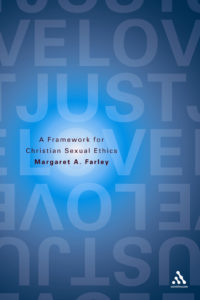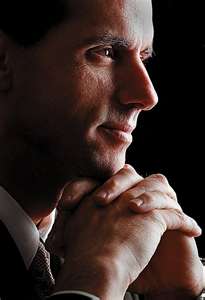You pursue work that matters because you want to leave the world a better place than you found it. By doing so however, you
 inevitably run afoul of those who want to keep everything more or less like it is.
inevitably run afoul of those who want to keep everything more or less like it is.
Attracting controversy also pushes you into the spotlight. With the lights in your eyes and a welter of voices clamoring around you, the heat of the moment calls upon you to say and do things that can either advance your goals, or set them back.
How you’ll respond at such times is important. It’s helpful to think about it, start visualizing how you want these moments to play out before they arrive.
While there are many who have handled these situations badly, there are also those who have summoned up the kind of amazing grace we can learn from. This past week brought just such a lesson.
Margaret Farley is a nun, a member of the Sisters of Mercy, and the emerita professor of social ethics at Yale Divinity School, where she has taught for 40 years. Throughout, she has been a celebrated teacher as well as the author of numerous books and articles, including Just Love: A Framework for Christian Sexual Ethics (New York, 2006).

Last week, after concluding an investigation that had lasted 3 ½ years, the Vatican’s Magisterium (or Teaching Office) condemned Just Love, because it “affirms positions that are in direct contradiction with Catholic teaching in the field of sexual morality” and therefore “cannot be used as a valid expression of Catholic teaching, either in counseling or formation, or in ecumenical and interreligious dialogue.”
In other words, the views Margaret Farley expressed in her book put her outside the boundaries of her faith. Her teaching itself—through argument and discussion in her book—was found to be an improper path for believers to follow in seeking either truth or understanding.
A half century ago, Margaret Farley chose to commit her life to a religious vocation of teaching within the Church. Since then, her work and her life have been united by this spiritual purpose.
Given her choices, the judgment she received last week is different than the rebuke of an employer, on the one hand, or the criticism of vested interests you are challenging, on the other. In each instance, what she has faced is more extreme.
The leaders of her own community of believers have publicly found that her work is incompatible with those shared beliefs. They have defined her as standing separate and apart from them. For a citizen, the word would be “traitor.” In a community of believers, it is usually “heretic.” Imagine standing where she stands today.

My aim here is not to take a side in this controversy but to comment on how Margaret Farley has conducted herself and continued her work in the midst of it. It is her courage and dignity—not her scholarship—that is teaching us today.
Her response was: Simple. Straightforward. Clear. Amidst a blizzard of media commentary (including in the New York Times and Washington Post) Margaret Farley issued one statement and gave one interview. She said her book was never intended to express “official Catholic teaching” but rather to help people “think through their questions about human sexuality.” It was an effort to move away from “taboo morality” and bring “present-day scientific, philosophical, theological, and biblical resources” into the discussion.
Not Angry or Contentious, but Disappointed about issues never addressed and opportunities lost. The Church said: “Sister Farley either ignores the constant teaching of the Magisterium or, where it is occasionally mentioned, treats it as one opinion among others.” She, in turn, asked: “Should power settle questions of truth?”
If we come to know a little more than we knew before, it might be that the conclusions we had previously drawn need to be developed, or even let go of. [To say that wasn’t possible] would be to imply that we know everything we need to know and nothing more need be done.
Not Seeking the Spotlight, but Standing her Ground once she was in it. Because the Church “is still a source of real life for me, it’s worth the struggle. It’s worth getting a real backbone that has compassion tied to it.”
Margaret Farley was my teacher at Yale. I know her as humble and earnest: engaged like the best teachers, careful like the best scholars. I sense enormous reluctance in her notoriety: for her to be taken as a champion for divorce or gay marriage, or even as a spokesperson for believers who are drifting from their Church because of its difficulties addressing questions of gender and sexuality. But her reluctance does not preclude her resolve—and this is where we find her today.
Once Margaret Farley was thrust into the spotlight, she knew what to do.


 brought to it had left its mark. In the volley that followed, I explained her with these words:
brought to it had left its mark. In the volley that followed, I explained her with these words:

